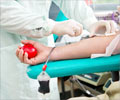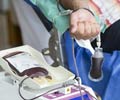Blood Donors-Types
"Donor" means a person who voluntarily donates blood after he has been declared fit after a medical examination, for donating blood, on fulfilling the criteria given hereinafter, without accepting in return any consideration in cash or kind from any source, but does not include a professional or a paid donor.
MINISTRY OF HEALTH AND FAMILY WELFARE(Department of Health)
Voluntary donors - Here the donor donates blood as a humanitarian act as a result of intense motivation. This is the best kind of blood donation as it is a self-less service. The identity of the donor can be hidden, if he so desires. When a donor gives blood to be stored for later use for an unknown recipient it is called allogenic or homologous blood donation. Camps can be held for this kind of donation and an event where many allogenic donors come to give blood is called a Blood drive or Blood donor session. When blood is donated by a person to be used at a later date by that person it is called autologous blood donation.
a) Replacement donors - During an emergency, the relatives and friends of an affected individual donate blood, irrespective of blood group, to the blood bank and in turn the bank releases the required group blood for the individual’s need. This is quite common is developing countries and rare in the developed world.
b) Professional donors -These donors exchange their blood for cash or other incentives. They donate blood at frequent intervals and it is very likely that they transmit lethal diseases through the donated blood.
Before donating blood it is ensured that donors are medically fit to donate blood. Their medical history is recorded and they are physically examined to ensure that they don’t suffer due to blood donation. Their Hemoglobin or hematocrit level is tested. Being anemic is the primary reason why most donors are turnd down. In addition to this the BP, temperature and pulse rate of the patient are evaluated. Pregnant women and elderly folks are usually discouraged from donating blood.












